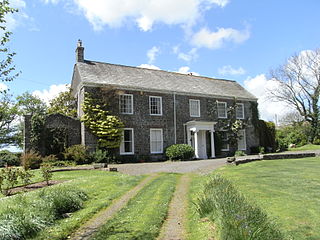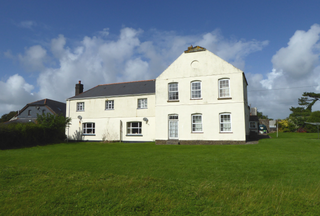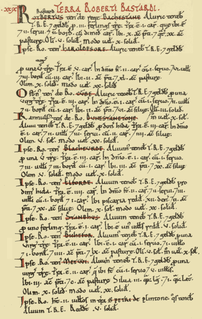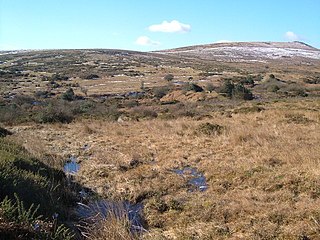Related Research Articles

Teignbridge is a local government district in Devon, England. Its council is based in Newton Abbot.

Ilsington is a village and civil parish situated on the eastern edge of Dartmoor, Devon, England. It is one of the largest parishes in the county, and includes the villages of Ilsington, Haytor Vale, Liverton and South Knighton. The parish is surrounded, clockwise from the north, by the parishes of Bovey Tracey, Teigngrace, Newton Abbot, Ogwell, Bickington, Ashburton, Widecombe-in-the-Moor and Manaton. In 2001 the population of the parish was 2,444, greatly increased from the 886 residents recorded in 1901. The parish is represented in parliament by Mel Stride, as part of the Central Devon constituency.

Drewsteignton is a village, civil parish and former manor within the administrative area of West Devon, England, also lying within the Dartmoor National Park. It is located in the valley of the River Teign, 13 miles (21 km) west of Exeter and 9 miles (14 km) south east of Okehampton. Visitor attractions in the area include the village centre itself, nearby Castle Drogo, and Fingle Bridge. The population of the ward at the 2011 census was 1,616.
Richard Fitz Turold was an eleventh-century Anglo-Norman landowner in Cornwall and Devon, mentioned in the Domesday Book. In the 13th century his estates formed part of the Feudal barony of Cardinham, Cornwall, and in 1166 as recorded in the Cartae Baronum his estates had been held as a separate fiefdom from Reginald, Earl of Cornwall.
Milton Damerel is a village, parish and former manor in north Devon, England. Situated in the political division of Torridge, on the river Waldon, it covers 7 square miles (18 km2). It contains many tiny hamlets including Whitebeare, Strawberry Bank, East Wonford and West Wonford. The parish has a population of about 450. The village is situated about 5 miles (8.0 km) from Holsworthy, 13.081 miles (21.052 km) from Bideford and 22.642 miles (36.439 km) from Barnstaple. The A388 is the main road through the parish.

Huish is a small village, civil parish and former manor in the Torridge district of Devon, England. The eastern boundary of the parish is formed by the River Torridge and the western by the Rivers Mere and Little Mere, and it is surrounded, clockwise from the north, by the parishes of Merton, Dolton, Meeth and Petrockstowe. In 2001 the population of the parish was 49, down from 76 in 1901.
William de Falaise, also called William of Falaise, was a Norman from Falaise, Duchy of Normandy, today in the Calvados department in the Lower Normandy region of north-western France. He became feudal baron of Stogursey in Somerset and also held manors in Devon.

The Domesday Book of 1086 lists in the following order the tenants-in-chief in Devonshire of King William the Conqueror:

Thuborough in the parish of Sutcombe, Devon, England, is an historic estate, formerly a seat of a branch of the Prideaux family, also seated at Orcharton, Modbury; Adeston, Holbeton; Soldon, Holsworthy; Netherton, Farway; Ashburton; Nutwell, Woodbury; Ford Abbey, Thorncombe, all in Devon and at Prideaux Place, Padstow and Prideaux Castle, Luxulyan, in Cornwall. The present mansion house, comprising "Thuborough House" and "Thuborough Barton", the north-east block, is a grade II listed building.
Floyer Hayes was an historic manor in the parish of St Thomas on the southern side of the City of Exeter in Devon, England, from which city it is separated by the River Exe. It took its name from the ancient family of Floyer which held it until the early 17th century, when it was sold to the Gould family. In the 19th century the estate was divided up and the manor house demolished. The parish church of St Thomas, situated a short distance to the west of the house, was burned down in 1645 during the Civil War, and was rebuilt before 1657. Thus no monuments survive there of early lords of the manor, namely the Floyer family.
Gotshelm was an Anglo-Norman magnate and one of the 52 Devon Domesday Book tenants-in-chief of King William the Conqueror and was also a Cornwall Domesday Book tenant-in-chief. He is listed in the Domesday Book of 1086 as holding 28 estates or manors in Devon from the king. His brother was Walter de Claville, also a Devon Domesday Book tenant-in-chief, who held 32 estates or manors in Devon from the king.
The Manor of Bicton is an historic manor in the parish of Bicton in east Devon, England.

Washfield is a village, parish and former manor in Devon, England, situated about 2 miles north-west of Tiverton. The parish church is dedicated to St Mary the Virgin. It was within the jurisdiction of the historic West Budleigh Hundred.

Webbery is an historic manor in the parish of Alverdiscott in North Devon, England.

Culm Davy is a historic manor and present-day hamlet within the parish of Hemyock in Devon.
The manor of Broad Hempston was an historic manor situated in Devon, England, about 4 miles north of Totnes. The present village known as Broadhempston was the chief settlement within the manor and remains the location of the ancient parish church of St Peter and St Paul.
Alfred the Breton was one of the Devon Domesday Book tenants-in-chief of King William the Conqueror. He had 22 landholdings in the county of Devonshire held in-chief according to the Domesday Book of 1086, and held further lands as a mesne tenant, including the manor of Panson in the parish of St Giles-in-the-Heath. His manors later descended to the feudal barony of Plympton.

Robert Bastard (fl.1086) was a Norman warrior who assisted in the 1066 Norman Conquest of England under King William the Conqueror. He was subsequently rewarded with landholdings in Devonshire and is one of the Devon Domesday Book tenants-in-chief of that monarch, with a holding of 10 manors or estates held in chief, 8 of which he held in demesne, i.e. under his own management without tenants. He had at least one further holding as a mesne tenant, at Goosewell, Plymstock parish, Plympton hundred, held from William of Poilley, a Norman tenant-in-chief from Poilley in Normandy, most of whose 21 landholdings were later granted by King Henry I (1100–1135) to his trusted supporter Richard de Redvers, feudal baron of Plympton in Devon.

Spridleston is an historic manor in the parish of Brixton in Devon, England, long a seat of a branch of the prominent and widespread Fortescue family. The ancient manor house does not survive, but it is believed to have occupied the site of the present Spriddlestone Barton, a small Georgian stuccoed house a few hundred yards from the larger Spriddlestone House, also a Georgian stuccoed house, both centred on the hamlet of Spriddlestone and near Higher Spriddlestone Farm.

Bagtor is an historic estate in the parish of Ilsington in Devon, England. It was the birthplace of John Ford (1586-c.1639) the playwright and poet. The Elizabethan mansion of the Ford family survives today at Bagtor as the service wing of a later house appended in about 1700.
References
- ↑ Thorn & Thorn, Part 2, Chapter 48
- ↑ Thorn, Caroline & Frank, (eds.) Domesday Book, (Morris, John, gen.ed.) Vol. 9, Devon, Parts 1 & 2, Phillimore Press, Chichester, 1985, Part 2 (Notes), Chapter 48
- ↑ Thorn & Thorn, Part 2, Chapter 48
- ↑ Thorn & Thorn, Part 2, Chapter 48
- ↑ Ellis, A.S., Biographical Notes on the Yorkshire Tenants Named in Domesday Book, published in Yorkshire Archaeological and Topographical Journal, Vol. IV, 1877, pp.245-6, quoted in Thorn & Thorn, Part 2, Chapter 48
- ↑ Thorn & Thorn, Part 2, Chapter 48
- ↑ Thorn & Thorn, Part 2, Notes, 48:10
- ↑ Thorn & Thorn, Part 2, Notes, 48:12